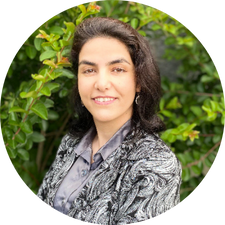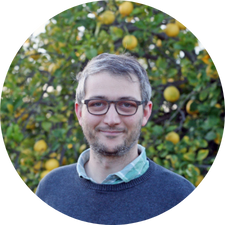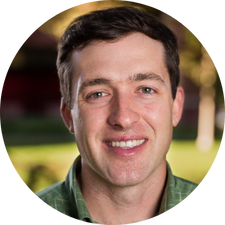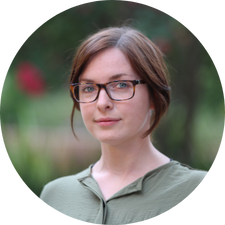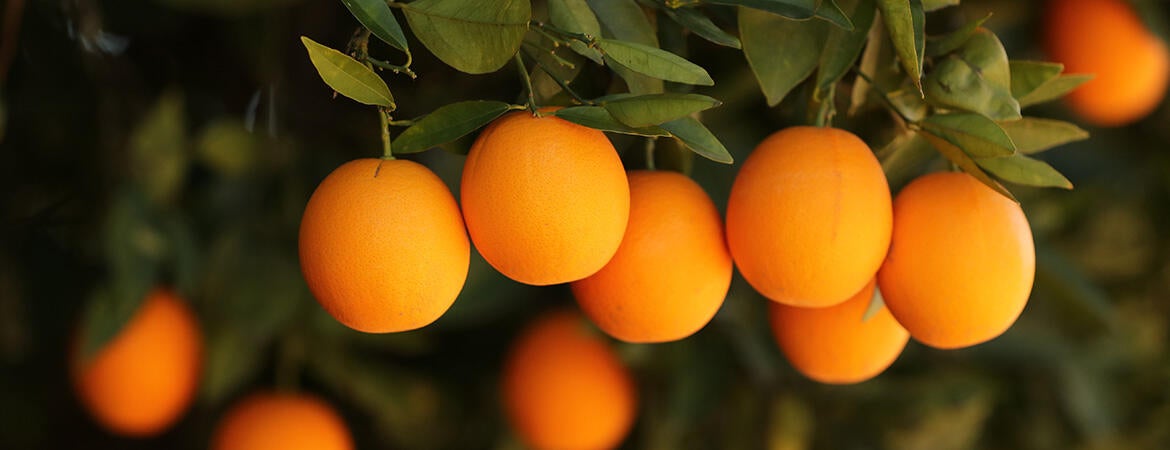
Nine speakers from the UC Riverside College of Natural & Agricultural Sciences (CNAS) gave talks highlighting their diverse research programs at the World Ag Expo held February 11-13 in Tulare, CA. In 25-minute sessions, five of which focused on the citrus industry alone, UC Riverside professors educated audiences on such varied topics as improving food safety in the supply chain to building a nationwide coalition to protect the dwindling honey bee population.
Peter W. Atkinson, CNAS Dean, attended the Expo and said by way of explaining the college’s presence at the event: “We are the place to solve tomorrow’s problems today.”
Dean Atkinson said that big problems confront the agriculture industry and that the faculty at CNAS are at the forefront – in the right place at the right time – confronting those challenges.
“Our campus is a vibrant and large institution that is devoted to solving big problems,” he said. “Because we’re in Southern California and 50 miles east of the coast, it’s an arid environment, and you don’t have to go very far for it to turn into a desert environment. We have to find solutions to agricultural problems in this arid eco-system. Essentially, it is what much of what the western U.S. will look like in the years ahead.”
The Expo, held in the International Agri-Center in Tulare, is the largest annual show of its kind, devoted entirely to issues affecting agriculture. In addition to the wide-ranging slate of seminars conducted by CNAS and other California colleges, the three-day event provided a platform of networking, education, and business in one of the most productive agriculture counties in the U.S.
Each year, the Expo hosts more than 1,200 exhibitors displaying cutting-edge technology and equipment and attracts estimated crowd of 100,000 attendees from more than 70 countries.
According to Dean Atkinson, when he and Patty Springer, CNAS Divisional Dean and Professor of Genetics, indicated to UCR faculty their wish for CNAS to be represented more concretely via seminars at the Expo, the professors didn’t need further prompting.
“They we all in,” he said. “With faculty who are based in Riverside and other faculty stationed up in the Central Valley, we were able to put together a real showcase of what we do in agriculture.”
Here is a rundown of the nine CNAS seminars conducted at the Expo:
In Strategies for Enhanced HLB Disease Management and Tree Health, Ashraf El-kereamy, Professor of Extension at UC Riverside and Director of the UC-ANR Lindcove Research and Extension Center, explored the current status of Huanglongbing (HLB) disease in California and the strategies being tested to combat it. HLB threatens citrus trees, and Professor El-kereamy explained various sustainable, science-driven approaches to enhance tree health, mitigate disease impact, and ensure the long-term viability of the citrus industry. “The presence of the CNAS leadership at our seminar during the World Ag Expo conveyed a strong message to Central Valley growers about the strength of UCR’s agricultural program and reflected the campus’s dedication to supporting California’s agriculture industry,” he said.
Ahmed El-Moghazy, Assistant Professor at UC Riverside, focused on efforts to develop a sensing platform for monitoring agricultural water safety in Advanced Technologies for Improving Food Safety in the Food Supply Chain. “In this seminar, I discussed our efforts to develop an easy-to-use sensing platform for real-time and on-site monitoring of agricultural water safety,” he said. “I also highlighted advancements in food-grade antimicrobial coatings designed to provide continuous self-sanitizing protection on fresh produce-handling surfaces helping to mitigate cross-contamination risks.”
Fruitful Future: Safeguarding Citrus and Avocado from Disease was presented by Fatemeh Khodadadi, Assistant Professor of Extension. This talk explored the critical issue of disease management in citrus and avocado production by discussing the major diseases affecting these crops, their impact, and effective control strategies. “The key takeaway for growers is that early, accurate detection of Avocado sunblotch viroid, coupled with proactive management strategies for avocado and citrus diseases, is crucial for safeguarding California's valuable crops,” she said. “We’ve seen that by implementing advanced molecular diagnostics like dLAMP, and by understanding the nuances of pre- and post-harvest diseases, growers can significantly reduce yield losses.”
Professor Khodadadi added that investing in these preventative measures now, through rigorous testing and informed orchard management, will yield significant benefits in the long term, ensuring the sustainability and profitability of their operations. “We are not just providing data; we are providing the tools and knowledge that empower growers to make informed decisions, protecting their investments and securing the future of California's avocado and citrus industries.”
In Growing Tree Crops Indoors: The Future of Farming Systems?, Professor Philippe Rolshausen, UC Riverside Professor of Extension and subtropical crops expert, took the guesswork out of his seminar’s title by showing how indoor farming is being deployed for citrus production to manage sunburn, wind and hail damage and citrus greening. “Indoor farming systems are the way forward given the increased pressure from pests and diseases and with an increasingly erratic climate” he said. “While this has become more main-stream for annual crops, we have a lot to learn when it comes to farming trees indoors. My team is poised to make significant inroads on growing citrus under a protective net.”
Can big data and AI tools improve crop production and help environmental stewardship? In Precision Measurements and Artificial Intelligence for XXI Century Agriculture, Elia Scudiero, Associate Professor of Precision Agriculture and Agronomy, answered with a qualified “yes.” In his lecture, Professor Scudiero said that UC Riverside scientists are investigating sensors, models, and currently commercially available technologies to separate the wheat from the chaff and discussed recent UC Riverside discoveries for water, nutrient, salinity, and weed management. “My talk showed that agricultural systems in California are often highly heterogeneous, because of the complex interactions of crop type and farmers management with environmental factors,” he said. “In highly heterogeneous farms, it may be wise to invest in precision agriculture technologies. In particular, my presentation discussed that portable sensors and satellites provide great data to characterize the spatial and temporal variability in soil and crops and to inform management to increase profitability and decrease environmental degradation.”
In The Citrus Clonal Protection Program: Protecting and Advancing California's Citriculture for Over 90 Years, Georgios Vidalakis, Professor and UC Extension Specialist in Plant Pathology at UCR, discussed how the Citrus Clonal Protection Program (CCPP), has been instrumental in safeguarding the citrus industry by providing pathogen-tested, disease-free propagative materials for nearly a century. “For more than 90 years, the Citrus Clonal Protection Program (CCPP) at UC Riverside has safeguarded the citrus industry by providing disease-free, pathogen-tested citrus propagative materials,” Professor Vidalakis said. “From pioneering efforts against the citrus psorosis disease in the 1930s to combating huanglongbing (HLB) today, our team uses cutting-edge tissue culture and high-throughput diagnostics to keep orchards healthy. Through our work with the National Clean Plant Network, the CCPP ensures a sustainable and resilient citrus future in California and beyond.”
Nut crops in California are grown on an estimated 2.5 million acres. And while current rootstocks have some resistance and tolerance to soil-borne plant pathogens, almond, pistachio, and walnut are infected and damaged by root lesion nematodes. In Nematode Management in California Nut Crops, Andreas Westphal, Professor of Extension in Nematology at UC Riverside, gave detailed management strategies including rootstock development and pre- and post-plant nematicide applications. “Highly desirable rootstocks that can withstand nematode-infections (and other soil-borne pathogens) are being developed for almond, pistachio and walnut,” he said. The research that will enable this outcome, according to Professor Westphal, “is done in collaboration with breeders, molecular geneticists, plant physiologists, agricultural engineers, economists and others.”
The presentation Development of a New Trap and Lure System for Leaffooted Bugs, delivered by Houston Wilson, Assistant Professor of Cooperative Extension at UC Riverside, provided an overview of the current ecology, monitoring and management of leaf-footed bugs in almonds and pistachios. Professor Wilson then summarized various lab and field studies to develop a new pheromone lure for monitoring this pest, as well as trap selection for use with the lure. “We’re really excited for this new lure to become available commercially since it will help growers and pest control advisors more easily monitor for this pest,” he said.
In Building a Wild Bee Conservation Coalition across the US, Hollis Woodard, Associate Professor of Entomology at UC Riverside, outlined our national need for wild bee conservation and monitoring and the steps being taken to protect wild bee pollinators. “I was so glad to see so many people at the World Ag Expo who care about wild pollinators, see their value for agriculture, and are taking steps to protect them and/or want to learn more,” she said. “I see a lot of opportunities to continue to work with the Ag Expo to increase awareness about wild pollinators and support attendees in their wild pollinator protection efforts!”
“Once the sessions were over, I was picking up on a lot of interactions between our faculty and industry folk who attended,” Dean Atkinson said. “I noticed the questions came primarily from folks in the industry who were looking to learn about new approaches for combating particular problems in agriculture that the seminars addressed. From our faculty perspective, they were meeting new people who were not necessarily from academia. And that’s great.
“When you see people in an audience like at the Expo who are fully engaged in what the seminars are about,” he continued, “that can lead to people asking more questions either directly or as follow-up which will, in turn, result in more relationships, even if nothing immediate comes out of the transaction.”


